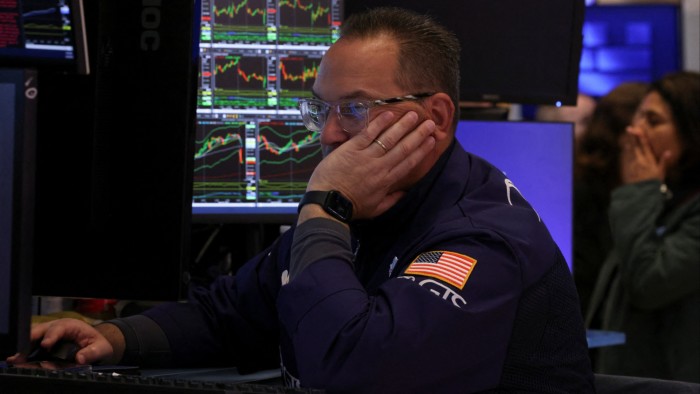Unlock the White House Watch newsletter for free
Your guide to what Trump’s second term means for Washington, business and the world
Wall Street stocks recovered from earlier losses on Wednesday as investors bought a market dip triggered by worse than expected GDP data in the US and a flurry of lacklustre corporate earnings.
The blue-chip S&P 500 fell more than 2 per cent in early trading in New York before recovering to close up about 0.1 per cent, for its seventh consecutive session of gains.
Starbucks, however, dropped 5.6 per cent after the coffee chain said late on Tuesday that quarterly net income halved year on year, while server maker Super Micro Computer — a supplier for chip giant Nvidia — tumbled 12 per cent after providing revenue and earnings per share guidance far below analysts’ expectations.
Nvidia fell 0.3 per cent and Tesla fell 3.1 per cent, pushing the tech-heavy Nasdaq Composite down less than 0.1 per cent.
Wednesday’s moves came after data showed the US economy contracted for the first time since 2022, shrinking by an annualised 0.3 per cent over the first three months of this year as companies rushed to buy imported goods in anticipation of President Donald Trump’s steep tariffs on most countries.
The performance was worse than economists’ most recent forecasts.
Data also showed inflation slightly higher than expected. The Personal Consumption Expenditures index — the Federal Reserve’s favoured measure of price growth — rose 2.3 per cent year-on-year in March.
“Inflation was also more elevated, fuelling the stagflation narrative and limiting what the Federal Reserve can do to help as economic sentiment sours,” said James Knightley, chief international economist at ING.
Others appeared less concerned, with Morgan Stanley’s chief US economist Michael Gapen writing in a note to clients that the headline drop in GDP “disguises strength in domestic demand growth”.
He added, however, that demand was likely to fall once the “shocks from tariffs, government lay-offs, ongoing slowing in immigration and other new policies” begin to show up in data over the coming months.
Consumer and business sentiment has plunged across the US in the wake of Trump’s aggressive tariff announcements, even as the stock market has rebounded in recent weeks after the bulk of the levies were postponed for 90 days.
“The economy was essentially stagnant in the first three months of the year, while growth in headline and core inflation accelerated,” said Ryan Sweet, chief US economist at Oxford Economics.
Concerns about the health of the world’s biggest economy hit commodity markets, with Brent crude, the international oil benchmark, down 1.7 per cent at $63.14 a barrel.
European equities ended the session in positive territory, with the region-wide Stoxx Europe 600 up 0.5 per cent and Germany’s Dax up 0.3 per cent.



